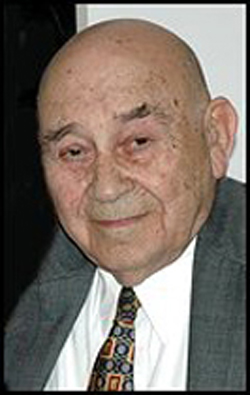Martin Blumenson – My Remembrance of a friend
The practice of writing history is unique in the bonds that are formed between those of us in this profession. In my more than twenty-five years in this business I’ve been blessed to not only have made some wonderful friends but also have been assisted by others who have shared their knowledge. Military history and biography are vast fields. No one can know it all. A vital part of what we do and our ability to do it well and accurately stems from the contributions of others. To get it right, we frequently call on colleagues for assistance, guidance, and to critique our work.
Early in my second career as a military historian I was blessed to have met and become a friend of Martin Blumenson, one of the giants of the great generation of World War II military historians. During his long life and rich career, Martin mentored a great many people (including ACG Editor in Chief, Jerry Morelock). Whether historians or students, he never turned down anyone and benevolently gave of his time and talents. Those of us who had the great good fortune to know Martin were deeply saddened by his death in 2005 (see Dispatches, November 2005 ACG). Unfortunately, I could not travel to Washington, D.C. to attend a memorial gathering of his friends and colleagues. Instead, I wrote the following essay about a true gentleman I was proud to call a friend and mentor:
{default}“Martin Blumenson, My Remembrance of a friend”
(Kindly read on my behalf at a remembrance at the Cosmos Club in Washington, D.C. by historian Steven L. Ossad)
Although I cannot be present today at one of Martin’s favorite places, I could not let this occasion pass without recording some thoughts that I respectfully pass along to his family and his many friends who are gathered here to remember Martin and [his late wife] Gève.

Martin Blumenson.
My debt to Martin Blumenson is huge. He was one of only three people who not only inspired me with the belief that history can be brought alive by good writing, but who also later became one of the reasons why I had the courage to write.
My connection with Martin began innocuously enough in 1975 when I was reassigned by the Army from Germany to Burtonwood Army Depot, England. I arrived in December without my family and, at loose ends one cold, rainy Sunday afternoon, signed out the key to our tiny base library which in reality was only a shelf of donated books that no one ever read. Fortuitously, one of them was the first volume of The Patton Papers, which I took back to my BOQ – and was hooked. I devoured it, fascinated by both Patton and the author. The book made such a profound impression on me that to this day it is one of the most cherished books in my library. Unable to find Vol. II, I ordered it from the States and spent weeks reading it with a map always at hand to help me trace Martin’s story of Patton’s war exploits.
Having grown up in the San Francisco Bay Area during World War II and seeing firsthand military activity everywhere, my childhood interest in the war was later whetted by visits to the Normandy battlefields, and by Martin’s books about Patton. Facing retirement in 1978, and certain that selling insurance or real estate was not my idea of a second career, I had a vague notion of wanting to write but was otherwise clueless.
I spent nearly two weeks composing a letter to Martin, rewriting it over and over, before daring to mail it. I asked his advice about a thesis I proposed to undertake about the war in Europe while doing graduate work in London. Not sure if I would even receive a reply, you cannot imagine how thrilled and delighted I was to receive a prompt, gracious and helpful letter on Martin’s customary yellow stationary, of which it later turned out he seemed to have a lifetime supply.
That letter began one of the most fortuitous relationships of my life. In 1981, I met Martin for the first time right here in the Cosmos Club, where he treated me to lunch. I had sent him a paper dealing with the Normandy campaign and it was in large part due to his encouraging words that day that I decided to scrap my PhD studies in London and write a book instead. Martin later read a good part of the manuscript of Decision in Normandy and helped me traverse the minefield of Allied intrigue without getting myself blown up.
[continued on next page]
Pages: 1 2


Hiya
I was wondering if you ever had a chance to study the Avalon Hill board games (Panzer Blitz, Squad Leader) and their subsequent reincarnation into the PC game “Close Combat.” There was a great paper published by a USA officer who used a version to train his officers and non-coms.
ref: http://www.closecombatseries.org
William